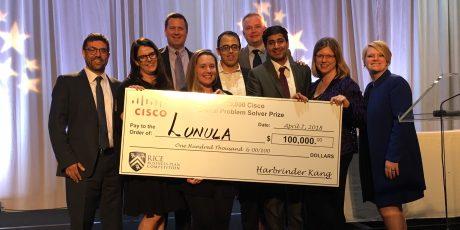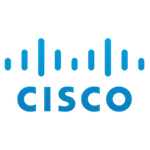Lunula Health Awarded Cisco Global Problem Solver Prize at 2018 Rice Business Plan Competition
by Harbrinder Kang, Senior Director, Corporate Affairs

The 17th annual Rice Business Plan Competition (RBPC) was held this past weekend, April 5-8, in Houston, Texas on the Rice University campus. The RBPC is the largest startup competition for graduate students, with submissions from close to 400 student teams from around the world.
It’s hosted jointly by the Rice Alliance for Technology and Entrepreneurship and Rice University’s Jones Graduate School of Business. Over US$2 million was invested, though the Cisco prize of US$100k (a non-dilutive cash prize) is the only one with strong social impact criteria.
Beginning in January, student teams submitted their entries, and 42 teams from 32 universities were selected to participate in the live pitch event in April. These teams arrived in Houston for a 3-day, whirlwind program that included significant feedback from and interaction with diverse judging panels.
This feedback and the iterative pitching rounds are a hallmark of the competition, offering students the opportunity to give their ideas a real-life test drive in front of decision-makers from the types of early-stage investors and venture capital firms they’ll be seeking out. In evaluating pitches for the Cisco Global Problem Solver Prize, our team of judges looks to identify ventures that embody the “tech for good” concept that is the foundation of Cisco’s Corporate Social Responsibility (CSR).
The first Cisco prize was offered at the 2016 RPBC and awarded to Neopenda, a health tech startup that makes lightweight, low-power wearable monitors that monitor newborn vitals, with the aim of improving newborn health in low-resource settings. The monitor is still in its prototype stages, but Neopenda plans to test it in clinical trials in Uganda later this year and bring it to East African markets in 2019.
In 2017, the winning team was Luso Labs, which was founded by Columbia University biomedical engineers with a mission to leverage digital technologies to make cervical cancer screening more accurate and accessible to women worldwide. Luso Labs is currently completing the medical-grade prototype of their screening system, cerVIA, to help healthcare workers in low-income areas detect cervical cancer in patients.
In this third year of Cisco’s sponsorship of RPBC, I had the opportunity to participate as a judge for the GPS prize. I was amazed to see the enthusiasm and creativity of these entrepreneurs, with their ground-breaking and innovative ideas. And I was particularly inspired by those teams we evaluated for their social impact, which this year revolved around primarily environmental or health solutions.
We were thrilled to announce this year’s winners from Georgia Tech — Lunula Health. This inspiring team has developed a transformative process to accurately measure blood hemoglobin levels (to detect anemia) by analyzing digital images of fingernail beds taken on a smartphone. Robert Mannino, the lead scientist, was excited that the Cisco prize would help bring their vision closer to fruition.
Cisco’s participation in the RBPC is just one of our many efforts within CSR to inspire and catalyze the next generation of global problem solvers. Cisco’s Global Problem Solver Challenge is another competition for post-secondary students and recent grads which also aims to recognize new, innovative solutions that leverage technology for social impact from entrepreneurs around the world.
Judging for the US$300k in prizes is currently underway and the 2018 winners will be announced next month. The GPS Challenge also features a “People’s Choice” US$10k prize based on public voting. Online voting for the People’s Choice winner will start on April 30 and run through May 18, so be sure to vote for your favorite finalist!
Until then, we offer our sincere congratulations to Lunula Health, the latest team using technology to bring solutions to our global community.

